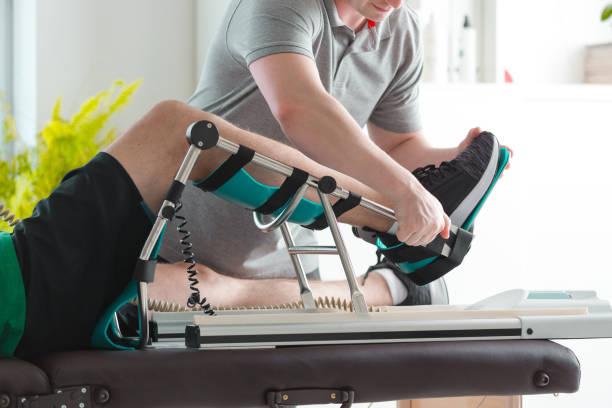If you are considering knee replacement surgery, the chances are that you are already experiencing a fair amount of knee pain. Knee replacement surgery, or knee arthroplasty, is recommended for people who experience severe knee pain and immobility, which has not been resolved by conservative treatments (such as medication and physical therapy).
Knee replacement surgery is a major surgical procedure, and some level of pain is to be expected following the surgery. Every patient's experience with knee replacement surgery and pain management is unique, and it is important to discuss any concerns about pain management with the surgical team during the follow-up process.
Conditions That Might Lead To Knee Replacement Surgery
Knee replacement surgery is an orthopaedic procedure, meaning that it affects the bones, joints, muscles and connective tissues. It may be necessary when there is a significant breakdown of the bone, cartilage and associated soft tissues that make up the knee joint. The most common conditions associated with knee replacement surgery are osteoarthritis, rheumatoid arthritis, trauma, avascular necrosis and failed previous knee surgeries - all of which generally cause pain and discomfort.
Osteoarthritis is the leading cause of knee pain and occurs when the protective cartilage in the joint wears down. Rheumatoid arthritis is an autoimmune disease that results in joint inflammation and deformity. Trauma, such as a severe knee injury, may require knee replacement surgery if other treatments fail. Avascular necrosis is a condition that occurs when bone tissue dies due to a lack of blood supply.
How Painful Is Knee Replacement Surgery?
Knee replacement is an open surgery that happens under general anaesthetics. This means that the surgeon will make a large incision to do the surgery, but that the patient will be unconscious or numb from the waist down during the surgery. The patient will not feel pain during the surgery.
How Painful Is Recovery From Knee Replacement Surgery?
Patients may experience pain and discomfort in the knee area for several days or weeks after their surgery. The amount of pain and discomfort experienced after knee replacement surgery can vary depending on several factors, such as the patient's overall health, pain tolerance and the extent of the surgery.
Pain is a subjective experience, which means that it is based on an individual's perception and cannot be objectively measured. However, healthcare professionals use a variety of methods to assess and quantify pain levels to help diagnose and treat pain.
A common theme among pain assessment tools is to have the patient subjectively score their pain according to a numerical scale from 0 to 10, where 0 is no pain, and 10 is excruciating pain. Moderate to severe pain is usually around 4/10 - which is generally the value at which patients usually become unsatisfied with pain control and request additional analgesics (painkillers).
The majority of patients who undergo knee replacement surgery report an overall reduction of pain - meaning that the pain they experienced after their knee healed was less than the pain before the surgery.
Patients typically experience a significant reduction in pain within a few weeks to months after the surgery as the knee heals. The length of recovery varies from person to person, but most patients can resume their normal activities within six to eight weeks after surgery. Worth noting, however, is that a small proportion of patients report ongoing pain for an extended period (more than six months) after surgery.
Pain management during recovery is a collaborative effort between the patient and their care team. Patients should communicate any pain or discomfort they are experiencing after surgery with their healthcare provider to ensure that their pain is managed effectively.
Post-Operative Pain Management For Knee Replacement Surgery
Pain management after knee replacement surgery is usually a combination of medications and other pain management techniques tailored to the individual patient based on their specific needs and preferences. Patients need to communicate any pain or discomfort they are experiencing with their healthcare provider to ensure that their pain is effectively managed during recovery.
- Medications: Pain medications such as opioids, nonsteroidal anti-inflammatory drugs (NSAIDs), and acetaminophen may be prescribed to help manage pain. Opioids are usually used in the first few days after surgery to manage acute pain, while NSAIDs and acetaminophen can manage pain over the longer term.
- Regional anaesthesia: An injection of a local anaesthetic around the knee joint can block pain signals and provide effective pain relief in the first few days after surgery.
- Physical therapy: Exercises and stretches prescribed by a physical therapist can help to reduce stiffness and pain in the knee joint and improve mobility.
- Ice therapy: Applying ice to the knee can help to reduce pain and swelling.
- Transcutaneous electrical nerve stimulation (TENS): This involves using a small device that sends electrical impulses to the nerves around the knee joint to help reduce pain.
- Acupuncture: This involves the insertion of small needles into specific points on the body to help manage pain and improve overall well-being.
- Mind-body techniques: Techniques such as deep breathing, guided imagery, and meditation can help to reduce stress and anxiety, which can contribute to pain.
Will Knee Surgery Hurt?
Knee replacement surgery is a major procedure and most patients who undergo knee replacement surgery will experience some level of pain and discomfort during recovery. However, the benefits of reduced pain and improved mobility are often worth it. The level of pain experienced can vary depending on the individual, and pain management techniques are tailored to the patient's specific needs and preferences. Pain is a subjective experience and it is therefore important for patients to communicate any pain or discomfort they experience during recovery with their healthcare provider to ensure effective pain management.


 71–75 Shelton Street, Covent Garden, London, WC2H 9JQ
71–75 Shelton Street, Covent Garden, London, WC2H 9JQ +44 (0) 20 3376 1032
+44 (0) 20 3376 1032



